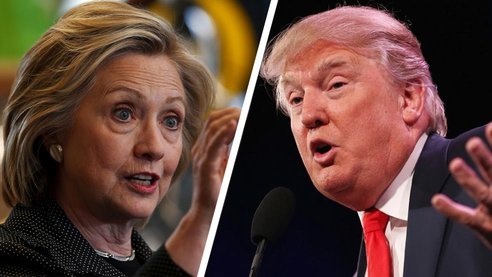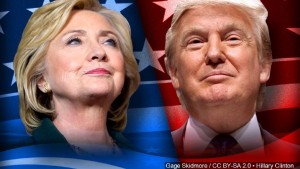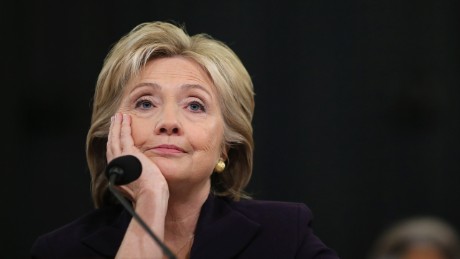
Neil A. Carousso produces NewsNation original “Kurt’s Country” – a celebration of country music and a slice of Americana with host Kurt Bardella.
-
Hurting America’s Future? The Effect Immigration Has on the Long Island Economy
Posted by: Neil A. CaroussoPost Views: 2,345By Neil A. Carousso
Immigration has been a forefront issue in the presidential campaign with Republican nominee Donald Trump vowing to build a wall along the Southern border and enforcing current immigration laws to ensure people enter the United States through the legal process instead of gaining sanctuary in the U.S. with many overstaying visas.
There are 526,000 immigrants living on Long Island, the site of the first presidential debate, according to the Fiscal Policy Institute’s analysis of the most recent data available from the Census Bureau’s American Community Survey for 2013. Throughout the election season, immigration has been discussed extensively as it has been a focal point of Donald Trump’s campaign. Of the more than half a million immigrants in the area, 98,000 people are living in the United States illegally.
“Other than refugees, people are choosing to come here and they’re certainly doing something good for them. It’s good for the overall economy of Long Island as well,” said David Dyssegaard Kallick, a senior fellow at FPI and the director of its immigration research initiative. FPI is a 25-year-old independent, nonpartisan, nonprofit research and education organization with the mission to improve the economic and social conditions of all New Yorkers.
Immigration labor contributes 20 percent of Long Island’s economic output. Immigrants are 18 percent of the region’s population.
While the national debates are dominated by discussion of immigrants from Mexico, who make up 28 percent of immigrants in the U.S. as a whole, people born in El Salvador constitute 14 percent of the Island’s immigration population.
“If you come from Guatemala or El Salvador and make it to a family [that makes the median income of $80,000], that is the American Dream,” Kallick said.
While there is an upside to the overall economy, American workers are being hurt on a micro level when competing with illegal immigrants.
“It does really impact everyone,” said Hofstra University junior Sarah Paquette, continuing, “I think it is important for everyone to truly understand what’s really going on.”
“Eventually, it does put a strain on the economy,” said Hofstra senior and student government president Damian Gallagher. “I think you could overpopulate certain schools where other children could become disadvantaged. I think in the work force when you have more bodies then, yes, it could affect the average Joe looking for a job.”
Hofstra will play host to the first presidential debate on Monday evening. It hosted a presidential debate in 2008 and 2012. The Long Island University was originally billed as an alternate in 2016 before Ohio’s Wright University withdrew from the debate, citing security concerns.
Millennials are fleeing Long Island, a long-term trend, due to high cost of living expenses and higher-level, more skilled jobs elsewhere.
“Competition…that’s life,” said Paquette, adding that she uses it as a “motivating factor.”
“There’s no way to have effective enforcement of immigration laws unless you have a point where everybody’s in compliance.” – David Dyssegaard Kallick, Fiscal Policy Institute
“There’s very little labor regulation, very little enforcement so people are able to pay lower wages is part of the problem,” Kallick said, noting other economic problems when illegal immigrants are employed such as “employers paying people without workers compensation, without paying unemployment insurance, without sort of being part of the regular system.”
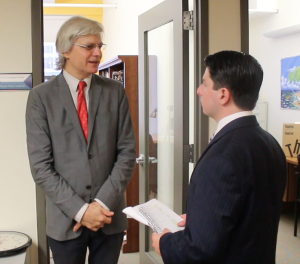
David Dyssegaard Kallick (left) and reporter Neil A. Carousso The illegal nature of undocumented immigration, Kallick points out, means lower wages for young American workers. Young black men with a high school degree or less suffer the most.
“There’s no way to have effective enforcement of immigration laws unless you have a point where everybody’s in compliance,” said Kallick, who has been with FPI since the summer of 2001.
It is estimated that there are 11 million illegal immigrants in the United States, which Kallick believes is accurate within 20 percent, according to his research.
Evidently, legal immigration significantly benefits the American economy, whereas illegal immigration has pitfalls for a nation’s economy and security.
“I think there needs to be a system where you first of all say, how do you make sure everybody’s in compliance – employers and employees? How do you make sure that people who come here, do come here legally? Because, you don’t want to come here illegally across the borders or even legally, which is in fact 40 percent of undocumented immigrants come and overstay visas,” said Kallick, adding, “How do you stop that from happening? And, I think there are good ways to think about it, but again, it has to be in a context where you can think about enforcement.”
-
Commander-in-Chief Comparison: Clinton vs. Trump
Posted by: Neil A. CaroussoPost Views: 2,997By Neil A. Carousso
It has been over 17 months since Hillary Clinton announced her candidacy for president of the United States of America while Donald Trump began his quest for the Republican nomination over 15 months ago. Since then, in two hard fought nomination processes, Mrs. Clinton and Mr. Trump have laid out their vision for America’s national security, which is arguably the most important issue the next president will face. Unfortunately, there have been many distractions and diversions away from important conversations of substance in favor of controversy, many of which have been exaggerated by both political establishments.
Here, let’s outline the Democratic and Republican nominees’ national security proposals.
On the Left
Former Secretary of State Clinton has been in politics in some capacity for roughly 33 years. Therefore, we can review her national security record, which is rather damaging and concerning to many Americans. In fact, according to the latest New York Times/CBS News Poll, Clinton’s untrustworthy rating has soared to a record 67 percent.
Clinton has been criticized by her own base for being a military hawk, with many young Americans embracing Senator Bernie Sanders’ (D-VT) “democratic socialism” philosophy, pushing Mrs. Clinton far left during the primaries. Clinton voted for the Iraq War as a senator and pushed for the U.S. Intervention in Libya as secretary of state. She supported the nuclear deal with Iran and lobbied President Barack Obama to take military action against Bashar al-Assaad in Syria. In March, at the American Israel Public Affairs Committee (AIPAC), Sec. Clinton never mentioned the plight of the Palestinians, which was brought up by Sanders at an April debate in Brooklyn, NY.
President Obama withdrew U.S. troops from Iraq in 2011, which allowed al-Qaeda to reemerge and rebrand as the Islamic State after being decimated in Iraq as a result of an increased military operation in 2007 along with Sunni Arab tribes.
Obama had rejected Clinton’s advice to sever Syria’s close ties with Iran, the largest state sponsor of terrorism, by being more aggressive towards Syria in order to protect civilians and allow for Syrian rebels to overthrow Syrian President Bashar Assad’s regime.
During the George W. Bush Administration, Libya’s leader Moammar Goddafi renounced its nuclear weapons program in 2003 and allowed the United States and Britain to destroy Libya’s nuclear weapons infrastructure. Libya had also renounced terrorism, turning over terror suspects.
In 2011, under the Obama Administration, the Arab Spring uprisings in Tunisia and Egypt spread to Libya. Gaddafi sought to forcefully end the revolt. Sec. Clinton, in working with NATO, launched a campaign to stop Gaddafi who was overthrown by Libya’s rebels. This result directly gave rise to al-Qaeda, which launched a terrorist attack that killed four Americans in Benghazi on September 11, 2012, including U.S. Ambassador Chris Stevens, Information Officer Sean Smith, and two CIA operatives, Glen Doherty and Tyrone Woods.
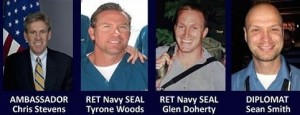
The American victims who died in Benghazi, Libya on September 11, 2012. In the days following the attack, Clinton and the White House incorrectly blamed the attack on a protest over an anti-Islam video, even while Clinton e-mailed her daughter Chelsea, under the pseudonym of “Diane Reynolds,” within hours of the attack, on her unsecured e-mail server, that the attacks were engaged by an “Al Qaeda-like group.” This mother-daughter exchange, revealed while Clinton was under oath in front of Congress on October 22, 2015, proved that Sec. Clinton misled the American people. The Benghazi attack was in fact a premeditated terrorist attack. Republicans saw this blatant coverup as a way for the Obama Administration to spin the narrative during a reelection campaign. Clinton famously remarked “What difference does it make?” when being questioned on whether or not she purposely misled the American people into believing the attack was a result of a anti-Islam video.
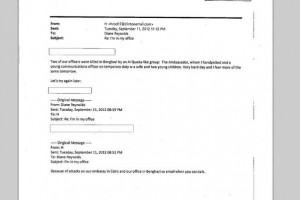
The e-mail from Hillary Clinton to her daughter Chelsea acknowledging the terrorist attack in Benghazi. 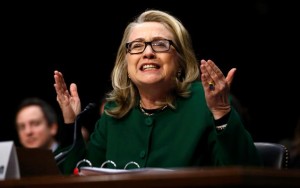
“What difference does it make?” Sec. Clinton testifying before the House Select Committee on Benghazi on October 22, 2015. (Courtesy: Jason Reed/REUTERS) Multiple investigations by Clinton’s State Department and the House Select Committee on Benghazi found that State failed to provide security at the diplomatic post in Benghazi while American troops begged for military support. The survivors of the Benghazi attack have told their story through the apolitical “13 Hours” film, detailing the horrific details of September 11, 2012.
Egypt had been ruled by President Hosni Mubarak for nearly 30 years. President Mubarak was a former general who cooperated with the United States and Israel on counterterrorism efforts, while crushing its opponents.
Mubarak was ousted by his own military in 2011 when the Arab Spring spread to Egypt. Clinton, in her memoir Hard Choices, said that she advised President Obama to move with caution toward Egypt. However, Obama, swayed by idealism, supported the democratic movement that overthrew Mubarak. Clinton’s State Department attempted to work with several political parties, including the Muslim Brotherhood, a previously outlawed group which sought to impose a radical Islamic ideology in place of a secular government. A political party, representing the Muslim Brotherhood, gained power in 2012.
Five months later, after Clinton’s departure from State, the government of Mohamed Morsi was overthrown in favor of a general, elected president under a “rigged” election, according to International monitors.
President Bush ordered the invasion of Iraq in 2003 in a post-9/11 America. While many consider the “Iraq War” a mistake, a war Clinton voted for, the presence of 145,000 U.S. troops reduced violence from an anti-U.S. insurgency. President Obama vowed during his presidential campaign of 2008 to bring the troops home, which he did in 2011.
Clinton unsuccessfully attempted to mediate between the Baghdad government and opposition groups. Her State Department failed to reach an agreement with Iraq’s government to provide legal protection for a small amount of U.S. forces to keep the peace in Iraq. This led to resurgence of violence and policies, imposed by the country’s Shiite majority, that alienated the Sunni Arab and Kurdish minorities.
This failed State Department initiative led to the rise of ISIS when the Sunni tribes that helped the U.S. military defeat al-Qaeda embraced the Islamic State fighters in 2014. Obama sent military trainers and advisors back to Iraq.
Iran had been pursuing a nuclear weapons research program and selling oil at a relatively steady rate during the Bush presidency, according to the United Nations nuclear watchdog agency. Obama and Clinton pursued strengthened international sanctions against Iran, while secretly pursuing a diplomatic solution to Iran’s nuclear threat, currently known as the “Iran Nuclear Deal.”
The harsh international sanctions, approved by Congress and the European Union, created dire economic conditions in Iran. China and Russia then joined the international sanctions, removing large markets for Iranian petroleum. While crude exports dropped in 2012 to its lowest level to 1986, Iran expanded its nuclear program.
The Iran deal was finalized under Clinton’s successor John Kerry in July 2015. While the U.N. says its implementation has kept Iran’s nuclear program peaceful, the largest state sponsor of terrorism has taunted U.S. Navy Ships and the Obama Administration has come under fire for making payments of $400 million and $1.3 billion to Iran days after they captured U.S. Navy officers.
Syria, a close ally of Iran, had been ruled under a brutal dictatorship under Assad and when the Arab Spring uprising in Syria led to civil war in 2011, Sec. Clinton saw it as an opportunity to disconnect Syria from Iran. While the U.S. ambassador to Syria encouraged Clinton and the Obama Administration to increase U.S. support to moderate Syrian rebel groups and impose a no-fly zone in Syria in order to prevent Assad’s air force from targeting civilians, President Obama rejected this advice. The Islamic State formed as a militant army that took control of territory in Syria that was vacated by retreating Assad troops.
Since then, the Islamic State has grown exponentially and the civil war has continued with over 400,000 deaths reported. In 2012, President Obama failed to follow through on his 2012 “red line” warning to Assad against the use of chemical weapons, but when he used them against rebels in 2013, the U.S. did not retaliate, sending the signal to the rebels that the U.S. would not support them. Since Clinton left office, though, Obama agreed to assist in training Syrian rebel groups to fight ISIS, but refuses to assist Assad.
The civil war has also posed a national security threat with hundreds of thousands of people fleeing to neighboring countries, creating a migrant crisis in Europe as well as fears and the reality of ISIS-inspired terrorism in Europe and the United States.
Clinton’s Handling of Classified Information
Moreover, Clinton said her lawyers “went through every single e-mail” to determine which e-mails were personal and which e-mails were work-related. Mrs. Clinton said they were “overly inclusive” in which e-mails were provided to the State Department. Comey revealed that the lawyers did not go through every e-mail; they instead used search terms to identify work-related e-mails, adding that it is “highly likely” they missed some. It was later revealed that Clinton’s team, one of which admitted under oath that he did not have security clearance to view the material, used “BleachBit” to permanently destroy e-mails.
It is believed by security experts that Clinton’s private email server faced hacking from Russia, Germany and South Korea and that Mrs. Clinton has made national security secrets vulnerable, potentially putting CIA operatives’ lives at risk. Clinton’s lack of transparency in many forms raises significant questions about her Commander-in-Chief credentials to possess such high government intelligence.
The Clinton Foundation and its Role in the State Department
Last month, the Associated Press wrote that “more than half the people outside the government who met with Hillary Clinton while she was secretary of state gave money — either personally or through companies or groups — to the Clinton Foundation. It’s an extraordinary proportion indicating her possible ethics challenges if elected president.” It indicates a pay-for-play environment whereby Clinton is being alleged to have given priority State Department meetings and considerations to those who donated to the Clinton Foundation.
In addition, her and her husband, President Bill Clinton, took exorbitant amounts of money from foreign nations such as Saudi Arabia, Jamaica, Kuwait, Qatar, the United Arab Emirates and the Sultanate of Omen who treat women as second-class citizens and impose harsh penalties, including death in the case of Saudi Arabia and the United Arab Emirates, for homosexuality.
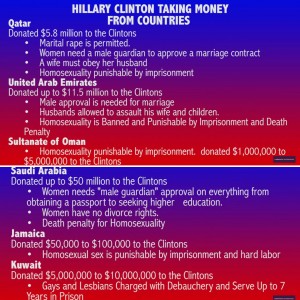
Nations the Clintons have taken money from, which include those who treat women as second-class citizens and impose harsh penalties for homosexuality Clinton’s National Security Vision for the Future
Mrs. Clinton has an extensive background in political office with a particularly damning and controversial national security record. However, as Commander-in-Chief, Clinton says she will intensify the “coalition air campaign against ISIS fighters, leaders and infrastructure.” Clinton said this month on NBC’s “Commander-in-Chief Forum” that she will not put troops on the ground in Iraq or Syria to combat ISIS. Clinton emphasizes for a need for a “diplomatic strategy” to resolve the Syrian civil war and the conflict between the Sunnis and Shias in Iraq.
Clinton says we must “stem the flow of jihadists from Europe and America to and from Iraq, Syria and Afghanistan” by working with our allies to cut off supplies, money and weapons as well as fighting radical propaganda online by intercepting communications.
As far as “hardening our defenses at home,” Clinton suggests we need to increase intelligence efforts to identify and stop terrorists, “stop gun sales to suspected terrorists” and increasing background checks on guns.
In terms of paying for our defense, Clinton says she will “prioritize defense reform initiatives” and maintain a limited military budget.
In fact, military spending “has fallen every year for four years since [2011] by a cumulative 15 percent,” under President Obama, according to PolitiFact. In addition, the U.S. has its smallest Navy fleet since 1917.
On the Right: Donald Trump’s National Security Vision
Mr. Trump, an entrepreneur and billionaire businessman, is considered a political outsider who is often praised for surrounding himself with the “best” advisors. He has assembled a team of national security advisors, including General Michael Flynn, former New York City Mayor Rudy Giuliani, Alabama Sen. Jeff Sessions, counter-terrorism expert Walid Phares, energy consultant George Papadopoulos, former Defense Department inspector general Joe Schmitz, managing partner of Global Energy Capital Carter Page and former Lt. Gen. Keith Kellogg.
Trump emphasizes the need for an “America First” policy, including securing America’s borders by building a wall on the Southern Border and enforcing current immigration laws to end the flow of illegal immigration and illicit drugs from flowing into the United States. Trump vows to triple the amount of Immigration Customs Enforcement (ICE) officers to detain and return all criminal illegal immigrants, put an end sanctuary cities, crack down on immigrants who overstay their visas and cooperate with local gang task forces to apprehend and deport illegal aliens in gangs. Trump’s policy is that of enforcing already existing laws to minimize the threat from illegal immigration crime and “lawlessness” to encourage people who “love” and respect America to enter the country legally. “This will be funded by accepting the recommendation of the Inspector General for Tax Administration and eliminating tax credit payments to illegal immigrants,” according to Trump via his campaign website.
As far as ISIS is concerned, Mr. Trump promises to “knock the hell out of them” by any means necessary, including the possibility of ground troops and air strikes. Trump, in criticizing politicians’ policies that are too transparent, states that he will not reveal specifics in order to refrain from telegraphing his strategy to the enemy. While Trump says he has a plan, if elected, he would give the Pentagon 30 days to present a plan for destroying the Islamic State and then he will compare plans and review all his options to defeat radical Islamic terrorism.
Mr. Trump laid out plans earlier this month to jettison current defense-spending caps and increase the size of our “depleted” military. The Republican nominee said he wants to boost the number of active Army troops from 490,000 to 540,00, build a Navy of 350 surface ships and submarines, up from 275 current ships, add about 100 fighter craft to the Air Force to bring the total to 1,200 and grow the number of Marine Corps battalions from 23 to 36, or an extra 12,480 troops.
Trump emphasizes the need to work with our allies like Israel. However, Trump does not believe in interfering in nations’ disputes besides our own unless it presents a need for American involvement for the safety of our country and the world.
Hillary Clinton and Donald Trump will debate for the first time on Monday, September 26 at Hofstra University.
-
Police Chase in Newark Leaves an Innocent Pedestrian Dead, Neil A. Carousso Reports for Channel 7 Eyewitness News
Posted by: Neil A. CaroussoPost Views: 2,018NEWARK, New Jersey (WABC) — A pedestrian was hit and killed in Newark early Friday morning, August 19 during a police chase.
The young woman was walking on the sidewalk with two friends on Washington Street near Court Street around 2:30 a.m. when she was struck Friday night.
Amid a mess of car parts and broken glass and twisted metal were candles and balloons in a memorial to a woman whose only mistake was to walk down the block.
“Everybody loved her,” said Yvonne Willis, the victim’s aunt.
Chynna Willis’ devastated mother just had to see for herself, the spot where an out-of-control car flew off University Avenue and crushed the 24-year-old, who may not even have seen it coming.“He had to hit her so hard from the impact her sneakers flew off,” Yvonne said.“I heard the skidding and then I heard the boom,” a witness said.
It happened at 2:30 in the morning as prosecutors say Newark police were chasing a suspect driving a Dodge Charger, when he careened around a curve and jumped the curb. Eyewitnesses say cops were right behind him.
“It was three cars back to back like in a movie, the lights blazing and everything,” said Crystal Warner, an eyewitness.
“Cars on top of the fence, people screaming, hollering,” said Eugene Antwine, an eyewitness.
“My daughter was pinned they said, under the hood of the car,” her mother said.
Willis wound up so deep in the wreckage, at first it seemed like she’d been in the car.
As for the driver, police got him right away.
“One person was like walking really fast, walking down the street and cops caught him right away,” Warner said.
Prosecutors identified him as 45-year-old Ken Gunther. They won’t say why cops had been chasing him, though sources say they found a large quantity of drugs in his car.
Chynna’s family is demanding an explanation.
“I blame the cops for chasing him because whatever he did, I’m quite sure it wasn’t that serious,” Yvonne said.
“Was the drugs worth you all taking her life? Because we will never get her back,” said Shaanna Willis, the victim’s cousin.
Gunther sustained minor injuries and was treated and released from University Hospital. He has been charged with one count of eluding and one count of resisting arrest, but more charges are expected.
The investigation is active and ongoing.
Josh Einiger from WABC-TV New York contributed to this reporting.
-
ICYMI: Mike Piazza and Ken Griffey Jr. Highlight 3rd Annual Hall of Fame Live Special
Posted by: Neil A. CaroussoPost Views: 2,199By Neil A. Carousso
Last weekend, Mike Piazza and Ken Griffey, Jr. were inducted into the National Baseball Hall of Fame as the second New York Mets and Seattle Mariners players, respectfully, to be represented in Cooperstown. I co-hosted a “Long Island Community Spotlight Special” with Basia of WRHU-FM in New York and executive produced and hosted “WRHU’s 3rd Annual Hall of Fame Live Special with Neil A. Carousso” from the induction ceremony, both airing on induction day, Sunday, July 24 as we celebrated America’s Pastime. Guests of the “Live Special” include former Mets manager Bobby Valentine, Kenny Albert of Fox Sports, WFAN’s Mike Francesa and Howie Rose, the voice of the Mets.
Featured image photo credits: Mike Piazza (Jeff Haynes/AFP/Getty Images) Ken Griffey Jr. (Otto Greule Jr/Getty Images)
-
“I Don’t Think She’s Trustworthy.” America’s Millennials on Hillary Clinton’s Integrity
Posted by: Neil A. CaroussoPost Views: 2,497By Neil A. Carousso
Millennials, defined as individuals who reach adulthood around year 2000, have been closely watching the 2016 presidential campaigns. Many were mobilized by Senator Bernie Sanders’ (I-VT) message of a “future to believe in” while not trusting now Presumptive Democratic Presidential Nominee Hillary Clinton because of her history taking large sums of money from corporations and countries for the Clinton Foundation and for speeches.
On July 5, FBI Director Jim Comey laid out a scathing report of the agency’s investigation of Hillary Clinton’s private e-mail server, actually multiple servers, which Comey revealed, to the American people.
“One hundred and ten emails in 52 e-mail chains have been determined by the owning agency to have contained classified information at the time they were sent or received,” Comey said in front of a national television audience. “Eight of those chains contained information.”
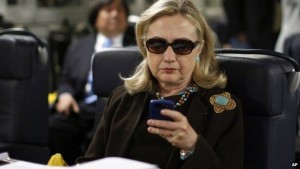
KEVIN LAMARQUE/AP Former Secretary of State Hillary Clinton has denied using a private e-mail server multiple times including a March 10 press conference, two Democratic presidential debates and under oath in front of the U.S. House Select Committee on Benghazi on October 22, 2015
“There was nothing marked classified on my e-mails, either sent or received,” Clinton said under oath in response to questioning from Representative Jim Jordan (R-OH).
Clinton had also been caught in hostile questioning from Rep. Jordan regarding her blaming of the September 11, 2012 Benghazi attack on a video when she told her daughter, Chelsea, and the Egyptian Prime Minister Hisham Kandil within 24 hours that it was, in fact, a terrorist attack. Four Americans including U.S. Ambassador J. Christopher Stevens died in Benghazi, Libya.
Millennials react to the campaign, specifically discuss whether or not they trust Mrs. Clinton. A recent New York Times/CBS News Poll indicates Clinton’s “not honest and untrustworthy” numbers are at an all-time high 67 percent, up 5 percent from last month.



